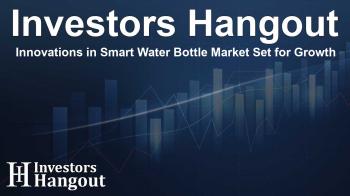Innovations in Smart Water Bottle Market Set for Growth

Exploring the Smart Water Bottle Market Growth
The global smart water bottle market is anticipated to reach extraordinary heights with innovations paving the way for growth. Valued at approximately $256.9 million in 2023, this industry's trajectory hints at a sophisticated future, projecting a remarkable $896.6 million by 2035 at an impressive CAGR of 11.2%. The rising trend of health consciousness and technological advancements play pivotal roles in this transformation.
What Is a Smart Water Bottle?
A smart water bottle serves as more than just a drinking vessel; it is a multifaceted tool that helps users monitor their hydration levels efficiently. These bottles integrate technology that tracks water intake, sends reminders for hydration, and connects with smartphones via Bluetooth or Wi-Fi. With functionalities like temperature control and UV sterilization, smart bottles have significantly evolved from their basic predecessors.
Market Dynamics and Trends
The surge in the fitness and wellness culture has catalyzed the adoption of such innovative hydration solutions. Health awareness surrounding the importance of hydration has prompted users to incorporate smart water bottles into their daily routines. Features like hydration sensors and app connectivity enable users to ensure they drink enough water throughout the day, adapting their intake according to their activities. Notably, the integration of AI technology enables personalized hydration recommendations, making these bottles an intelligent choice for health enthusiasts.
Market Segmentation
The smart water bottle market can be segmented based on technology, material, price range, and distribution channels. Predominantly, hydration tracking technology has emerged as a leader, followed closely by options that utilize stainless steel materials for durability. The economy segment is dominating the price range, appealing more to budget-conscious consumers while still offering advanced features.
Regional Overview
The North American region currently leads the smart water bottle market, primarily due to high consumer demand for health-focused devices and connected products. The U.S., being a significant contributor, sees innovative brands introducing smart designs that cater to tech-savvy consumers. For instance, recent launches from companies focus on user engagement through sophisticated hydration tracking features and stylish designs.
Europe is also experiencing steady growth, attributed to an increasing focus on sustainability and health awareness. Countries in Europe, particularly Germany and the U.K., are witnessing a rise in smart water bottle usage among health-conscious consumers. The push for sustainability aligns with the rise of reusable products, further propelling the demand for non-plastic smart water solutions.
Meanwhile, the Asia-Pacific region is projected to grow the fastest. Rapid urbanization, rising disposable incomes, and growing fitness consciousness are intertwining to create a robust market for smart water bottles. With the increasing popularity of online sales channels, manufacturers are leveraging e-commerce to reach wider audiences effectively.
Challenges and Solutions
Despite the market's promising outlook, challenges remain. The high cost of smart water bottles compared to traditional options can deter some consumers. However, many manufacturers are striving to produce budget-friendly models by incorporating essential features instead of high-cost functionalities.
Battery life is another critical factor that manufacturers are actively addressing. Strategies such as designing energy-efficient models and exploring solar-powered options are on the rise, contributing to a more user-friendly experience.
Looking Ahead: Opportunities Await
As companies prioritize sustainability, the demand for eco-friendly hydration solutions will significantly grow. The increasing need for hydration within corporate wellness programs also presents a lucrative opportunity for smart water bottle manufacturers. Major players in the market are aligning their strategies with consumer needs for sustainable and health-centered products to enhance market penetration.
Frequently Asked Questions
What are smart water bottles?
Smart water bottles are technologically advanced drinking vessels that track hydration levels, send reminders, and connect to apps for personalized hydration recommendations.
What is the current market size of smart water bottles?
The smart water bottle market was valued at approximately $256.9 million in 2023.
How fast is the smart water bottle market growing?
It is projected to reach $896.6 million by 2035, with a CAGR of 11.2% from 2024 to 2035.
Which materials are commonly used in smart water bottles?
Common materials include stainless steel, plastic, and others that emphasize durability and sustainability.
What are the main features of smart water bottles?
Key features include hydration tracking sensors, temperature control capabilities, UV-C sterilization, and connectivity options such as Bluetooth or Wi-Fi.
About The Author
Contact Addison Perry privately here. Or send an email with ATTN: Addison Perry as the subject to contact@investorshangout.com.
About Investors Hangout
Investors Hangout is a leading online stock forum for financial discussion and learning, offering a wide range of free tools and resources. It draws in traders of all levels, who exchange market knowledge, investigate trading tactics, and keep an eye on industry developments in real time. Featuring financial articles, stock message boards, quotes, charts, company profiles, and live news updates. Through cooperative learning and a wealth of informational resources, it helps users from novices creating their first portfolios to experts honing their techniques. Join Investors Hangout today: https://investorshangout.com/
The content of this article is based on factual, publicly available information and does not represent legal, financial, or investment advice. Investors Hangout does not offer financial advice, and the author is not a licensed financial advisor. Consult a qualified advisor before making any financial or investment decisions based on this article. This article should not be considered advice to purchase, sell, or hold any securities or other investments. If any of the material provided here is inaccurate, please contact us for corrections.

